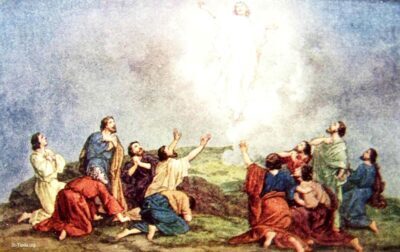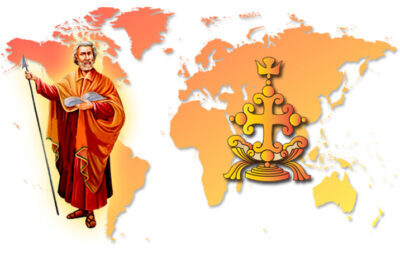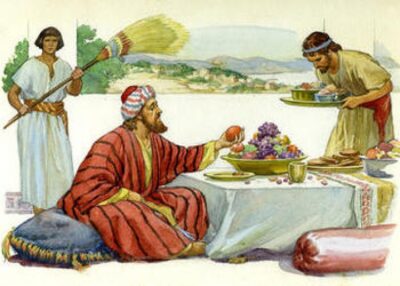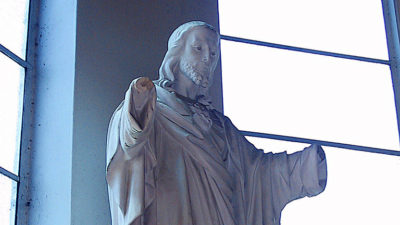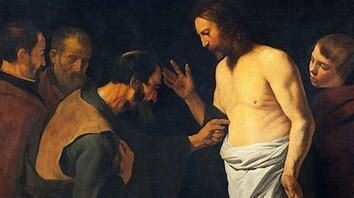January 22, 2023
|by N W
|
0 Comments
|
Commitment, Deacon Mark, Evangelization, Hope, Prayer, Scripture, St. Matthew
Third Sunday in Ordinary Time
January 22, 2023 — Year A
Readings: Is 8:23-9:3 / Ps 27 / 1 Cor 1:10-13, 17 / Mt 12-23
by Rev. Mr. Mark De La Hunt, Permanent Deacon
Pope Francis declared that the Third Sunday of Ordinary Time is to be devoted to the Word of God. He went on to say that this will be a fitting time for added focus on strengthening our bond with the Jewish people and to pray for Christian unity (Ordo pg 47). We will circle back to the last two in a bit, but let’s first dive into the scripture.
When you go bird watching, you are always looking with anticipation that you might see something special. It is no different with scripture. The more you know about it, the more you want to see it and the more you start looking for something special to appear.
Applying the bird watching analogy to scripture, it helps to know what to look for. Look for two senses, the literal and the spiritual. The literal is what the human author intended for his audience in that time and place. The spiritual is what the Holy Spirit wove into it. The spiritual sense has three parts: 1) The allegorical – Where is Jesus in this? 2) The anagogical – What does this say about the end of time? and 3) the moral – What does this passage mean for me?
If you have been listening to Fr. Mike Schmitz’s Catechism in a Year podcast, you understand how much the Church cherishes the scriptures. In that podcast, he read paragraph 103 from the Catechism which states that, “…the Church has always venerated the Scriptures as she venerates the Lord’s Body. She never ceases to present to the faithful the bread of life, taken from the one table of God’s Word and Christ’s Body (CCC 103 / Dei Verbum 21).” The catechism was quoting the Vatican II document on Divine Revelation called Dei Verbum. Dei Verbum is Latin for “Word of God.”
Since the Second Vatican Council, the Church has rotated through the three gospels of Matthew, Mark, and Luke in annual cycles. It also added Old Testament readings to the Sunday missal. Before Vatican II, Sunday readings were all New Testament, except for the Easter vigil and Pentecost, the feast of the Epiphany and a few other times. These additional scripture readings were intended to help us become more familiar with the Bible. This Church year is Cycle A, which follow’s Matthew’s gospel (Matthew, by the way, is one of my favorite characters in The Chosen series).
Speaking of series, you know how when you haven’t watched your Netflix or Prime series or “The Chosen” in a while, you watch the opening summary of past episodes. It gets you ready to enter fully into the next episode, understanding what is going on. Let’s do that with today’s gospel.
Here is the opening summary. We are in chapter 4 of Matthew’s gospel. It is helpful to know that chapters 3-7 of Matthew focus on the Announcement of the Kingdom (Cavins 2). At the end of chapter 3 earlier this year, Jesus is baptized by John the Baptist in the Jordan. At the beginning of chapter 4, Jesus is led by the Spirit to fast in the desert for forty days and then is tempted by Satan. Last Sunday we heard John the Baptist declare that Jesus is the “lamb of God” and the “Son of God.” Now, today’s gospel starts with these words, “Jesus heard that John [the Baptist] had been arrested.” You can just feel it. Today’s episode is going to be a big one.
Jesus, lamb of God and Son of God, goes to Capernaum by the sea, fulfilling Isaiah’s prophecy from today’s first reading. “Land of Zebulun and Naphtali, the way to the sea…the people who sit in darkness have seen a great light…in a land overshadowed by death light has arisen (Mt 4: 15-16).” Capernaum, a town on the northwest shore of the Sea of Galilee, is in the vicinity of where Zebulun and Naphtali were. Dr. Ed Sri points out that the Israelites in this area were the “first to experience the darkness of conquest and exile and now have become the first to see the light of God’s goodness in the Messiah (Sri 79).” And what does Jesus say to them? “Repent, for the kingdom of heaven is at hand (Mt 4:17).”
In this episode of Matthew, Jesus then goes to the Sea of Galilee and calls Peter, Andrew, James, and John, and they leave their jobs and family and follow Him (Mt 4:18-22). He then starts teaching in synagogues and “curing every disease and illness among the people.” The cliff hanger for today’s episode comes in the verses right after today’s gospel, which state that “His fame spread” and that He cured those “racked with pain, those who were possessed, lunatics, and paralytics” and that “great crowds came from all over (Mt 4:23-25).”
When an episode ends, they show the trailer for the next one. In this case, next Sunday’s episode is Matthew chapter 5 where Jesus proclaims to those “great crowds” the good news of the kingdom of heaven in the iconic Sermon on the Mount (Mt 5).” He will do so in an unprecedented way in human history. Not Buddha, not Confucius, and not Mohammed spoke the way Jesus did. The people listening were astounded because “…He taught as one who had authority (Mt 7: 29).” Fr. Mike Schmitz points out in the Catechism in a Year podcast that Jesus did not just quote the prophets. Pay attention to all the times Jesus says, “You have heard it said, but I say…” The next four Sundays between now and Ash Wednesday are all from the Sermon on the Mount.
Now let’s reflect on Pope Francis’s request to focus on our bond with the Jewish people and to pray for Christian unity. Regarding our bond with the Jewish people, Isaiah’s prophecy that Jesus fulfilled in today’s gospel is one of over three hundred Old Testament prophecies that He and only He fulfilled (Kreeft). God announced the coming of His Son through the Jewish people in the scriptures that we call the Old Testament. Jesus was raised in a devout Jewish family and frequented the synagogue as a devout Jew. Our Catholic faith has many symbols and traditions that reflect the Jewish tradition our founder, Jesus Christ, knew well. Examples include the church seasons, candles, singing Psalms, incense, and the Tabernacle accompanied by an ever-burning candle.
The Second Vatican Council fathers summed up well how we should view our Jewish brothers and sisters. They wrote, “The apostle Paul maintains that the Jews remain very dear to God, for the sake of the patriarchs, since God does not take back the gifts he bestowed or the choice he made (NA 4; Rom 11: 28-29).” “Remembering then, its common heritage with the Jews and moved…by Christian charity, [the Church] deplores all hatreds, persecutions, and displays of antisemitism levelled at any time or from any source against the Jews (NA 4).” Sadly, these things are on the rise in our country, so keep our Jewish brothers and sisters in your prayers and defend them in word and deed when needed.
Regarding praying for Christian unity, remember what St. Paul said in the second reading. “I urge you…that there be no divisions among you, but that you be united in the same mind… (1 Cor 1:10-13).” What mind? The mind of Jesus. Here is a way to respond to Paul’s exhortation. Our Christian brothers and sisters share the same twenty-seven books of the New Testament with us. Many recite the Nicene Creed and sing some of the same hymns we do. We work shoulder to shoulder with them at various charities in Bedford and Moneta, and in solidarity with them we share a love of God, family, and country. What we have in common is substantial. When divisive scripture and tradition debates pop up, humbly, patiently, and lovingly try to steer the conversation to what we have in common.
If they ask you if you have personal relationship with Jesus Christ, say yes, but that you also have a communal relationship with Him as a member of the Body of Christ. Add that your relationship is not just personal or communal, but that it is intimate. For through the priest, it is Jesus who baptizes (Mt 3:11; Acts 2:38), forgives sins (Jn 20: 22-23; 2 Cor 5 17-20), feeds us His Body (Lk 22:17-19; 1 Cor 10:16), confirms us in the Holy Spirit (Acts 8:14-17;19: 5-6), makes us one flesh in marriage (Mt 19:5-6), heals us through anointing (Mk 6:12-13; Jam 5:14-15), and sets apart men as deacons, priests, and bishops (Jn 20:22; I Tim 3:2 (Bishops); Acts 20:28; 2 Tim 1:6 (priests); Acts 6:6; I Tim 3:8 (deacons)). By the way, if you look at Holy Name of Mary’s website in two weeks you can look at this homily and see the scripture verses for these.
If they ask you if you have been saved, say yes. Jesus placed His Spirit in you at your baptism (Acts 2:38). That is the same Spirit that raised Him from the dead and so too will raise you from the dead (Rom 8:11). But then steer the conversation back to our shared beliefs and values: the Ten Commandments, the New Testament, the Father, Son, and Holy Spirit, the commandment to love God and neighbor, the love of scripture and the need for Jesus our Savior. And maybe remind them who our shared enemies are; our sin and the evil falsehoods the lost try to teach others to believe. All Christians are united most especially by our Lord, but also by our shared values and beliefs, and our shared enemies.
If you do not remember anything else from this homily, remember what I am about to say. Remember the lesson of bird watchers? They learn about the characteristics and names of birds and then look around them with the expectation that something special might appear. If you read scripture daily, in prayer, God will occasionally speak to you in a special way. And what He says will change your life for the better. How does He do this?
He does so in an infinite number of ways, always suited to your specific needs. Here are a couple I have experienced. Sometimes a verse will seem to light up on the page, just stand out in some way. Sometimes you will read a verse and the meaning will be very different than what you know it should be, but when you read it again, that peculiar meaning is still there. When these things happen, stop. Write down those words and pray over and reflect upon them for several days until you understand how God wants you to respond. Seek spiritual direction if you are not sure.
Here is a closing image. We have a dad that we were separated from long ago. And we want to know more about Him so we can know more about ourselves and make sense of our lives and this world. Turns out, He has written us a book that tells us how much and why He loves us. In that book, He helps us make sense of our behaviors that confound us, pointing out our strengths and weaknesses. He shares His wisdom on how to live our lives. He tells us what makes Him proud of us. And He shares good news. He has built a home for us and in His book, He has given us a map that shows us The Way. Amen.
Citations:
Curtis Mitch and Edward Sri. Catholic Commentary on Sacred Scripture: The Gospel of Matthew. Baker Academic 2010.
Diocese of Richmond. Ordo- Order of Prayer in the Liturgy of the Hours and Celebration of the Eucharist 2023.
Jeff Cavins. Matthew-The King and His Kingdom Great Adventure Bible Study. Ascension Press 2011.
Peter Kreeft. Food for the Soul – Reflections on the Mass Readings for Cycle A. Word of Fire 2022.
The Catholic Church. Nostra Atate: The Declaration on the Relation of the Church to Non-Christian Religions.
The Catholic Church. Dei Verbum: The Dogmatic Constitution on Divine Revelation.
KEEP READING
 540-586-8988
540-586-8988 

